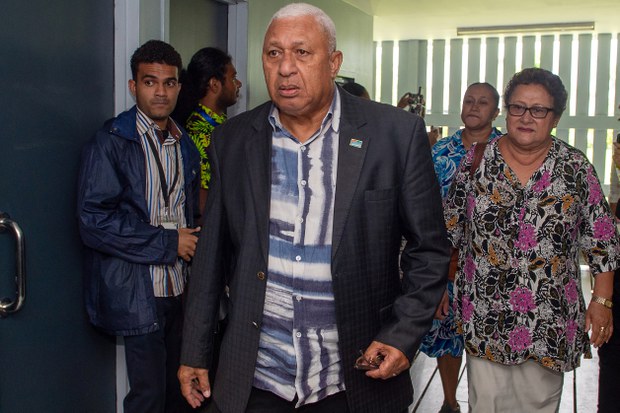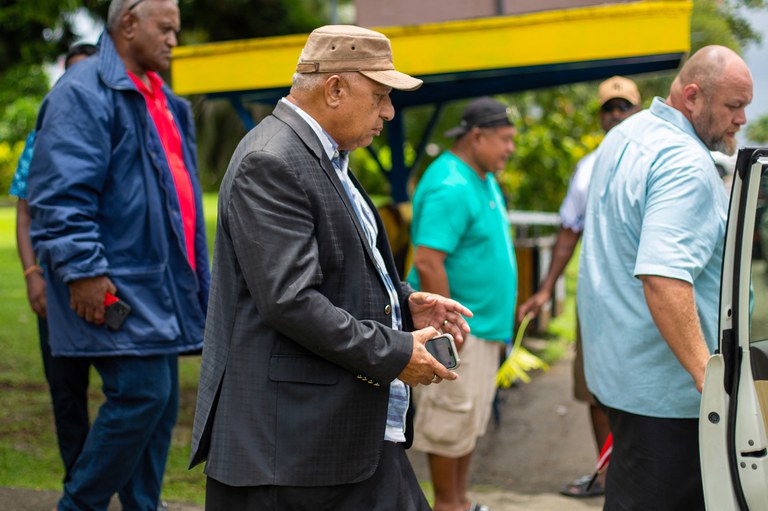Former Fiji leader Bainimarama guilty of interfering in police investigation
2024.03.14
Brisbane
 Former Fiji Prime Minister Frank Bainimarama (center) leaves a court in Suva, Fiji on Feb. 7, 2024.
Former Fiji Prime Minister Frank Bainimarama (center) leaves a court in Suva, Fiji on Feb. 7, 2024.
Fiji’s former strongman Prime Minister Frank Bainimarama interfered in a police investigation while in power, according to a court ruling Thursday that overturned an earlier acquittal and could prevent him from running for office for the next decade.
The Pacific island country’s acting chief justice, Salesi Temo, ordered Bainimarama and his now suspended police chief, Sitiveni Qiliho, to be sentenced on March 28, the public prosecutor’s office said in a statement.
Bainimarama, who held sway over Fiji for 16 years after seizing power in a coup, and Qiliho faced trial last year because of allegations that they had shut down a police investigation into alleged financial mismanagement at the University of the South Pacific.
Temo said a lower court judge had “erred in fact and law” when she ruled in October that Bainimarama was not guilty of perverting the course of justice and that Qiliho was not guilty of abuse of office.
Fiji’s Crimes Act allows a maximum sentence of five years imprisonment for conspiring to defeat justice. Abuse of office can be punished with up to 17 years prison if it was done for personal gain. Bainimarama, nor the political party he leads, immediately commented on Thursday’s ruling.
Bainimarama’s years in power ended in December 2022 after his Fiji First Party dropped below 50% of the vote in national elections, allowing opposition parties to form a coalition government led by Sitiveni Rabuka. Both men are former coup leaders – Rabuka in the late 1980s and Bainimarama in 2006.
A purge of Bainimarama appointees from important public positions followed the change in government along with a slew of investigations into alleged abuses of office and the removal of restrictions on the media.
However, Bainimarama still commands a significant following in Fiji – the second most populous Pacific island country with nearly 1 million people – while the initial enthusiasm for Rabuka’s coalition government has faded amid cost-of-living increases, slowing economic growth and scandals involving government ministers.
According to Fiji’s 2013 constitution, drafted under Bainimarama, candidates for Parliament must not have a conviction in the previous eight years for any offense that has a term of imprisonment of a year or more. Bainimarama also faces another trial after being charged with abuse of office in February.

Seini Puamau, the judge who acquitted the two men last year, said state prosecutors failed to make a compelling case that Bainimarama had advised Qiliho to end the police probe.
Puamau also said that a state witness, former acting Police Commissioner Rusiate Tudravu, had an axe to grind following his dismissal from Fiji’s police for a reason unrelated to the court case.
Nothing in his evidence pointed to Bainimarama directing him or anyone else to stop the investigation, she said. Qiliho, meanwhile, had not been aware the investigation had ended until he was questioned by the Criminal Investigation Department in 2022, Puamau said.
The office of the public prosecutor said it appealed Puamau’s decision on eight grounds. The judge made mistakes related to evidence and procedure that resulted in an “unfair trial and an erroneous verdict,” according to the public prosecutor’s statement.
Under the chief justice’s order, Puamau will be the sentencing judge for Bainimarama and Qihilo.
Fiji, a linchpin nation in a region increasingly contested by the United States and China, had a burgeoning relationship with Beijing under Bainimarama. Ties have been tested under Rabuka, who put a police cooperation agreement with China under review and reasserted the importance of maintaining a close security relationship with the U.S. and countries such as Australia and New Zealand.
Fiji’s relationship with China had blossomed after New Zealand, Australia and other countries sought to punish Bainimarama and his government for the 2006 coup.
Bainimarama left office grudgingly and stayed in the official prime minister’s residence for several weeks after Rabuka was confirmed as Fiji’s new leader by a vote in Parliament.
He was suspended from Parliament in February last year for three years after accusing the country’s president of failing to follow the constitution, which gives the military a guardian role over the nation’s politics.







